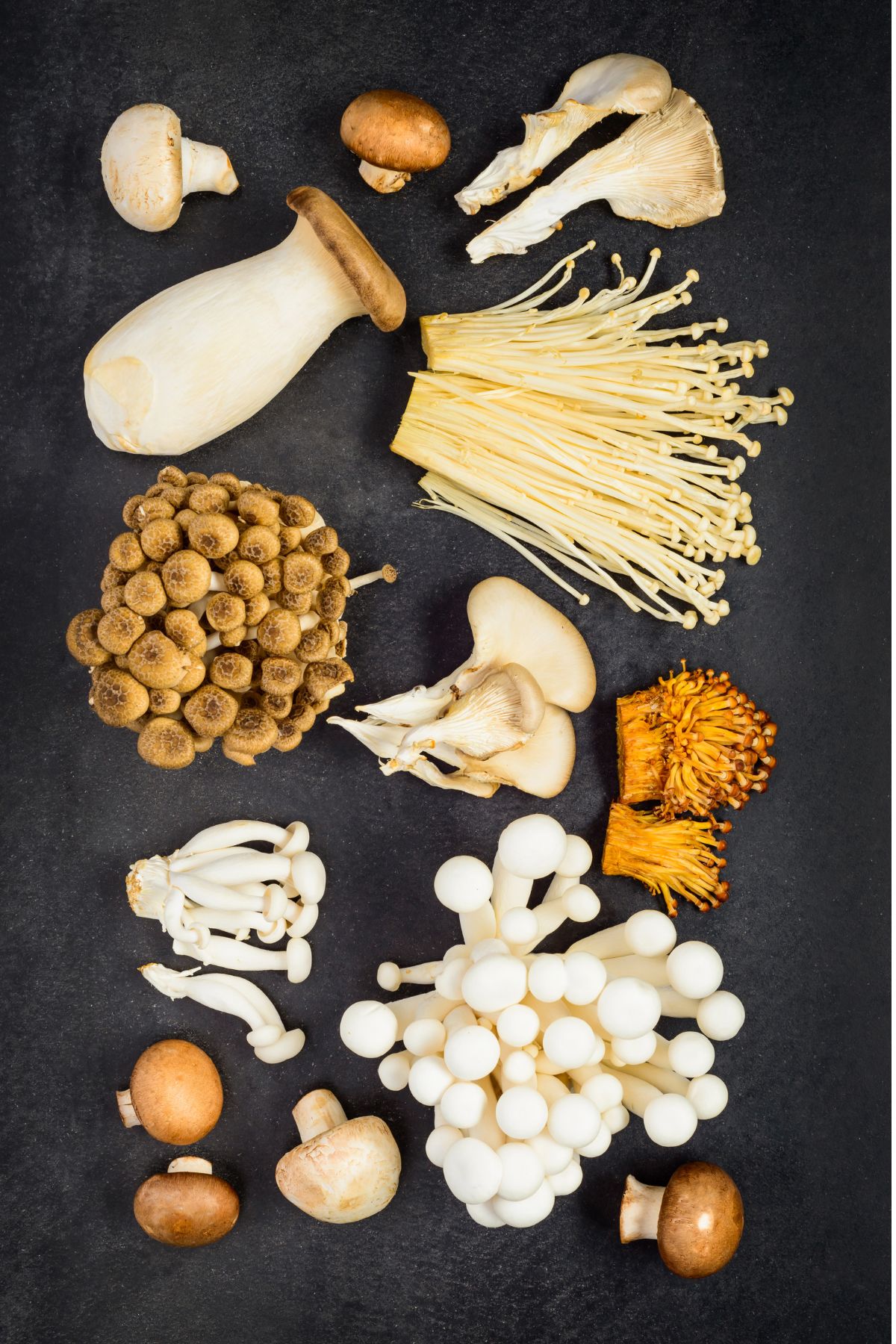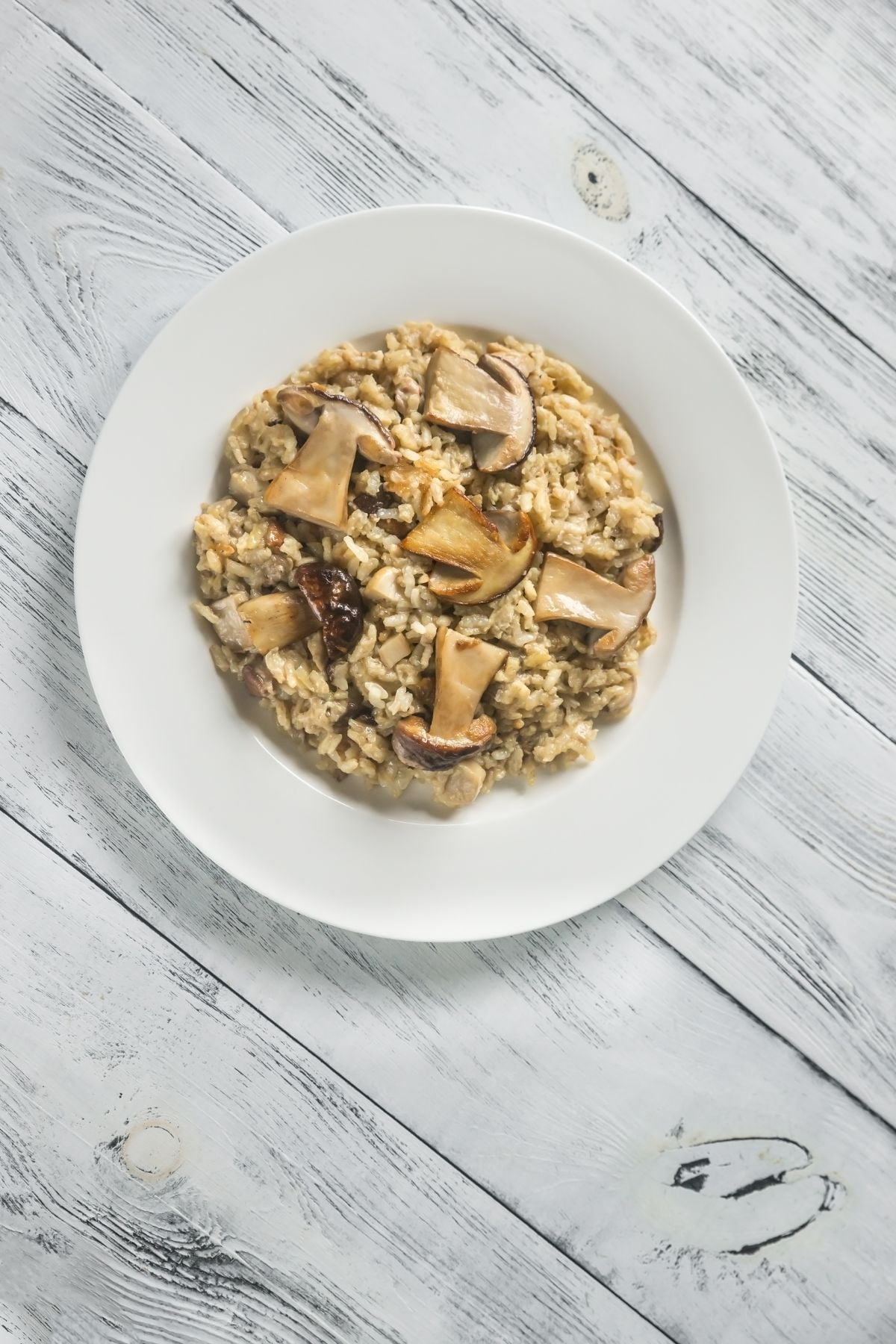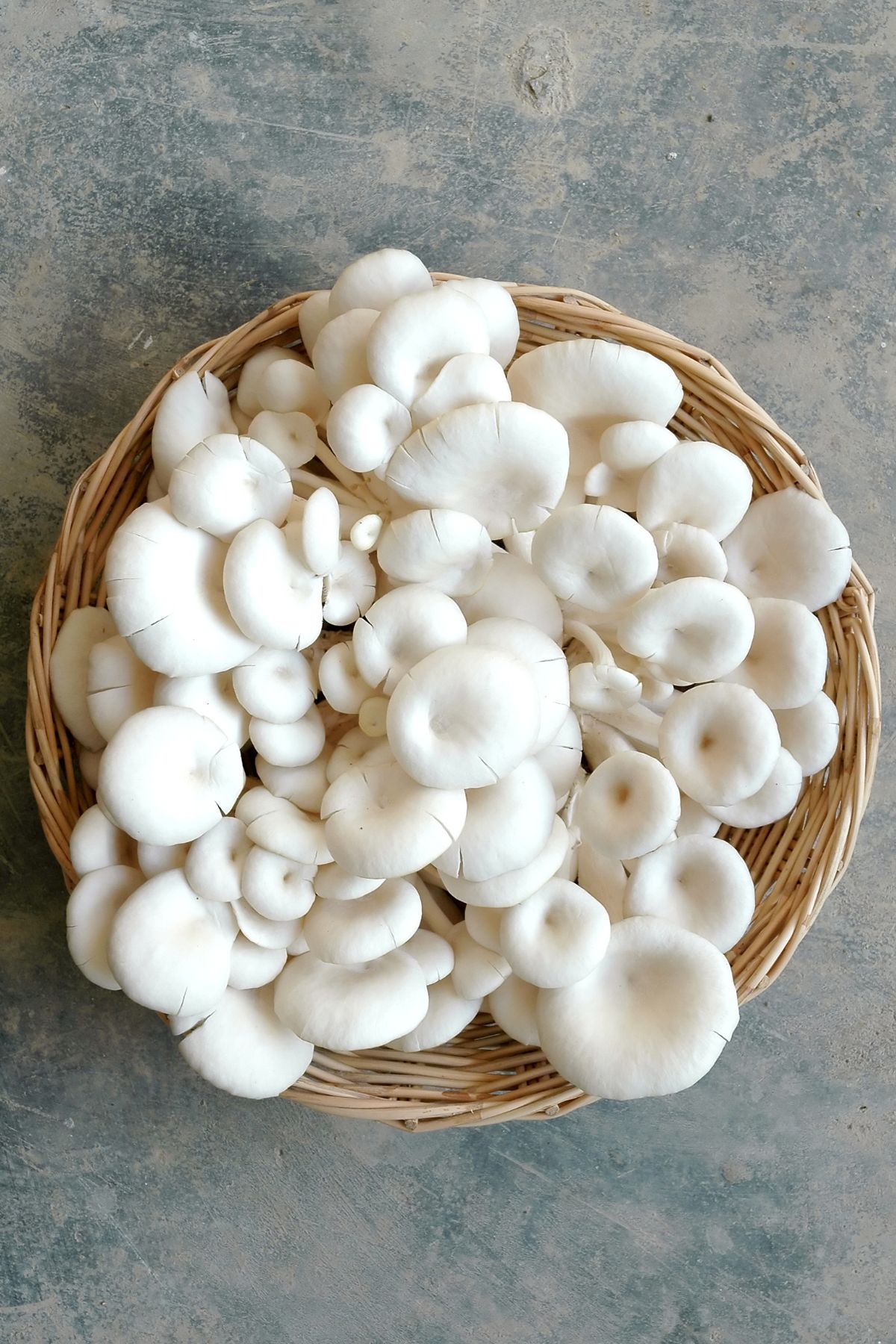Are mushrooms low FODMAP? This question is a common concern among those following a low FODMAP diet, particularly individuals managing irritable bowel syndrome (IBS). Mushrooms, with their unique flavors and nutritional benefits, are a staple in many diets. However, for those sensitive to certain carbohydrates, understanding the relationship between mushrooms and FODMAPs becomes crucial.

Learn whether peanut butter is low-fodmap here.
Table of Contents
This comprehensive guide delves into the world of mushrooms within the context of a low-FODMAP diet. We’ll explore various mushroom varieties, their FODMAP content, and their impact on gut health. Additionally, the guide offers practical advice on incorporating mushrooms into your diet, managing IBS symptoms, and navigating the complexities of FODMAPs. Whether you’re a seasoned low-FODMAP dieter or just starting, this article aims to provide valuable insights and tips to help you make informed dietary choices while enjoying the diverse and rich world of mushrooms.
Understanding FODMAPs
FODMAPs are a group of carbohydrates that are not well absorbed in the small intestine and can cause symptoms in individuals with IBS. The acronym stands for fermentable oligosaccharides, disaccharides, monosaccharides, and polyols. These short-chain carbohydrates are found in a wide range of foods, including certain fruits, vegetables, grains, and dairy products.
FODMAPs can be problematic in the context of IBS because they frequently cause the intestine to retain water, which causes gas, bloating, and discomfort. This is where the low-FODMAP diet comes into play. It’s designed to limit foods high in these fermentable carbohydrates, providing relief from IBS symptoms.
The low-FODMAP diet is often recommended as a short-term intervention to identify personal triggers for IBS symptoms. It’s not a one-size-fits-all solution but rather a personalized approach. To determine individual tolerance levels, the diet involves a strict elimination phase and a gradual process of reintroducing foods.
For anyone with IBS, understanding the role of FODMAPs in their diet is crucial. By identifying and managing these triggers, it’s possible to significantly reduce, or even eliminate, the uncomfortable symptoms associated with IBS.

Health Benefits Of Mushrooms
Mushrooms offer a wealth of health benefits, making them a valuable addition to a balanced diet. Here are some key health advantages to including mushrooms in your meals:
- Supports Gut Health: The fiber in mushrooms helps promote healthy digestion and bowel regularity. A healthy gut is essential for overall health, including a strong immune system.
- Rich in Nutrients: Mushrooms are a good source of essential vitamins and minerals, including B vitamins (B2, B3, and B5), copper, potassium, phosphorus, and selenium. These nutrients are vital for various bodily functions, including energy production, immune system support, and nerve health.
- Source of Vitamin D: Some varieties of mushrooms, especially those exposed to sunlight, are one of the few non-animal sources of vitamin D. Vitamin D is crucial for bone health, immune function, and mood regulation.
- Antioxidant Properties: Mushrooms contain antioxidants like selenium and ergothioneine, which help protect the body from harmful free radicals that can cause cellular damage and contribute to chronic diseases.
- Supports Immune Function: Certain types of mushrooms, such as shiitake and maitake, have been shown to boost immune system function thanks to their beta-glucans, natural compounds that help stimulate the immune system.
- Heart Health Benefits: The fiber, potassium, and vitamin C in mushrooms contribute to cardiovascular health. Potassium can help regulate blood pressure, reducing the risk of hypertension and cardiovascular disease.
- Weight Management: Low in calories and fat-free, mushrooms are a healthy choice for those looking to manage their weight. Their high fiber content also promotes a feeling of fullness, helping to reduce overall calorie intake.
- Anti-Inflammatory Effects: Some studies suggest that certain compounds in mushrooms have anti-inflammatory properties, which can be beneficial in reducing the risk of certain chronic conditions like heart disease and type 2 diabetes.
- Cancer-Fighting Properties: Research has indicated that mushrooms may have cancer-fighting properties. For example, some studies suggest that certain compounds in mushrooms may inhibit the growth of cancer cells, particularly breast and prostate cancers.
Low-FODMAP Mushroom Varieties for IBS Management
For those managing IBS with a low-FODMAP diet, it’s important to know which mushrooms can be safely included. Fortunately, there are several varieties that are low in FODMAPs and suitable for people with IBS.
- Oyster mushrooms: Oyster mushrooms are an excellent choice for a low-FODMAP diet. Most people with IBS should be able to tolerate one cup or 75 grams of oyster mushroom per meal because it is low in FODMAPs.
- Canned champignon mushrooms: Also known as button mushrooms, canned champignon mushrooms are another safe option. One serving of six pieces, or 75 grams, of these mushrooms is generally considered low-FODMAP per meal. It’s important to note that while fresh champignons are high in FODMAPs, the canning process seems to reduce their FODMAP content, making them more tolerable for those on a low-FODMAP diet. The canning process, which involves preserving the mushrooms in brine, appears to reduce the levels of FODMAPs, with mannitol and fructans leaching out into the liquid. As such, they have been tested and recognized as low in FODMAP content by Monash University when consumed in suitable serving sizes. It is essential, however, for consumers to rinse these mushrooms thoroughly after removing them from the brine to ensure that any residual FODMAPs are washed away.
- Slippery Jack mushrooms: A low serving of half a cup or 40 grams of these mushrooms is suitable for a low-FODMAP diet. However, their mannitol content can vary, so it’s advisable to consume them in moderation and observe your body’s response.
High FODMAP Mushroom Varieties to Avoid for IBS Sufferers
While some mushrooms are suitable for a low FODMAP diet, others are high in FODMAPs and should be avoided by individuals with IBS. These varieties can aggravate symptoms like bloating, gas, and abdominal discomfort.
- Shiitake mushrooms: Known for their chewy texture and earthy flavor, are unfortunately high in FODMAPs. They are often used in side dishes and as a meat substitute, but they can trigger IBS symptoms due to their polyol (specifically mannitol) content.
- Portobello mushrooms: Portobello mushrooms are another variety that should be approached with caution. Their savory and earthy qualities make them popular in many dishes; however, their high FODMAP content can be problematic for those with IBS.
- Enoki mushrooms: Despite their delicate texture and mild flavor, enoki mushrooms are also high in FODMAPs. These mushrooms are commonly used in Asian cuisine but can contribute to discomfort in sensitive individuals.
- Dried mushrooms: In general, dried mushrooms are higher in FODMAPs compared to their fresh counterparts. This includes varieties like dried black chanterelle and dried porcini mushrooms. The drying process concentrates their sugars, including fructans and mannitol, making them more likely to trigger IBS symptoms.
It’s important to remember that sensitivity to FODMAPs can vary from person to person. If you’re unsure about your tolerance levels, it’s best to consult with a healthcare professional specializing in IBS management. By avoiding high-FODMAP mushrooms and focusing on low-FODMAP alternatives, you can enjoy the health benefits of mushrooms without aggravating your IBS symptoms.

The Impact of Cooking Methods on Mushroom FODMAP Levels
When managing IBS with a low-FODMAP diet, understanding how cooking methods can affect the FODMAP content of mushrooms is crucial. The preparation of mushrooms can influence their digestibility and the way your body reacts to them.
- Sautéing mushrooms is a popular method that can enhance their flavor and texture. However, it’s important to be mindful of the oils and seasonings used. High-FODMAP ingredients, like garlic and onion, should be avoided or replaced with low-FODMAP substitutes, such as garlic-infused oil.
- Roasting mushrooms can also be a good option. This method helps to bring out the natural umami flavors and can make them more digestible for some individuals. However, as with sautéing, watch out for high-FODMAP additives.
- Boiling or steaming mushrooms is another technique that can be beneficial. These methods are gentle on the digestive system and can help in reducing the FODMAP content, particularly the polyols like mannitol. Boiling may leach some FODMAPs into the water, which can then be discarded.
It’s important to note that while cooking can alter the FODMAP content of mushrooms, it doesn’t completely eliminate them. Therefore, even with these cooking methods, sticking to low-FODMAP mushroom varieties is essential for those with IBS.
Fermentation And FODMAP Content In Mushrooms
The process of fermentation can have a significant impact on the FODMAP content of foods, including mushrooms. Fermentation involves the breakdown of carbohydrates by bacteria, yeast, or other microorganisms, and this can alter the levels of FODMAPs present.
In the case of mushrooms, fermentation can be a double-edged sword. On one hand, it can reduce certain FODMAPs, making them more tolerable for individuals with IBS. For example, the fermentation process can lower the levels of fructans, which are common triggers for IBS symptoms. On the other hand, fermentation can increase the mannitol content of mushrooms, increasing other FODMAPs.
It’s also crucial to consider individual tolerance when consuming fermented mushrooms. The degree to which fermentation affects FODMAP levels can vary based on factors such as the type of mushroom, the fermentation process used, and the duration of fermentation. For those following a low-FODMAP diet, it’s advisable to approach fermented mushrooms with caution. If you choose to include them in your diet, start with small portions to gauge your body’s reaction.
Incorporating Low FODMAP Mushrooms Into Your Diet
Integrating low-FODMAP mushrooms into your diet can be both enjoyable and beneficial, especially when managing IBS. Here are some practical tips and ideas for incorporating these mushrooms into your meals:
- Start with Safe Varieties: Begin by including low FODMAP mushrooms like oyster and canned champignon mushrooms in your diet. These are less likely to trigger IBS symptoms when consumed in appropriate serving sizes.
- Experiment with Cooking Methods: Explore different cooking techniques such as roasting, sautéing, boiling, straining, or steaming. These methods not only bring out the unique umami flavors of the mushrooms but also make them more digestible. Remember to use low-FODMAP seasonings and oils.
- Create Diverse Dishes: Mushrooms are incredibly versatile. Add them to salads, omelets, stir-fries, or use them as a topping for your favorite low-FODMAP pizza. They can also be a great addition to soups and stews, adding depth and flavor.
- Portion Control: Always be mindful of portion sizes to ensure you stay within the low FODMAP range. It’s helpful to refer to resources like the Monash University FODMAP app for guidance on suitable serving sizes.
- Pair with Other Low-FODMAP Foods: Combine mushrooms with other low-FODMAP ingredients to create balanced and gut-friendly meals. This not only helps in managing IBS symptoms but also ensures a nutritious diet.

Navigating Mushrooms On A Low FODMAP Diet: Tips And Tricks
Adopting a low FODMAP diet can be challenging, especially when it comes to understanding which foods to include or avoid. Here are some tips and tricks for navigating mushrooms on this diet, ensuring you can enjoy their health benefits and umami flavors without aggravating IBS symptoms:
- Educate Yourself: Knowledge is power. Familiarize yourself with the types of mushrooms that are low in FODMAPs. Resources like the Monash University FODMAP app can be invaluable in this regard.
- Start Small: If you’re reintroducing mushrooms into your diet, begin with small amounts. This can help you gauge your body’s reaction and determine your tolerance levels.
- Be Label Savvy: When purchasing canned or processed mushrooms, read labels carefully. Some products may contain high-FODMAP ingredients like garlic or onions. Opt for plain mushrooms without added sauces or seasonings.
- Keep a Food Diary: Tracking what you eat and how it affects your symptoms can be incredibly helpful. This practice can assist you in identifying which mushrooms and preparation methods work best for you.
- Experiment with Recipes: Don’t be afraid to try new recipes that feature low-FODMAP mushrooms. There are plenty of delicious and creative ways to include them in your meals without triggering IBS symptoms.
- Mind the Cross-Contamination: When preparing meals, be mindful of cross-contamination with high-FODMAP foods. Use separate cutting boards and utensils to keep your mushroom dishes safe for your gut.
Are Mushrooms Low FODMAP: Key Takeaways
Understanding how different types of mushrooms can affect those following a low-FODMAP diet is a key aspect of managing IBS. While some mushrooms are suitable and can offer numerous health benefits, others should be approached with caution due to their higher FODMAP content.
Remember, the journey with IBS and a low-FODMAP diet is deeply personal. It involves trial and error, patience, and a keen awareness of how your body responds to different foods. Incorporating low-FODMAP mushrooms into your diet can be a delightful experience, enriching your meals with their unique umami flavors and nutritional value, provided they align with your individual tolerance levels.
Ultimately, this guide encourages you to experiment with low-FODMAP mushrooms and discover what works best for you. With the right knowledge and approach, you can manage your IBS symptoms effectively while enjoying a diverse and nutritious diet. Remember, you are not alone in this journey, and with careful management, you can lead a comfortable and fulfilling life, even with IBS.
Are mushrooms high fodmap?
Mushrooms can vary in their FODMAP content, and not all varieties are high in FODMAPs. However, certain types of mushrooms are indeed high in FODMAPs and can trigger symptoms in individuals with IBS or those sensitive to these fermentable carbohydrates.
For example, varieties like shiitake mushrooms, portobello mushrooms, and some dried mushrooms are known to be high in FODMAPs, specifically in polyols like mannitol. This can lead to digestive discomfort in sensitive individuals when consumed in regular serving sizes.
On the other hand, there are mushroom varieties that are considered low-FODMAP and are generally well-tolerated by people following a low-FODMAP diet. These include oyster mushrooms, canned champignon mushrooms, and sometimes slippery jack mushrooms.
It’s important to be mindful of the specific type of mushroom and its FODMAP content, as well as individual tolerance levels, when including mushrooms in a diet aimed at managing IBS symptoms. As research in this area continues to evolve, consulting up-to-date resources like the Monash University FODMAP app can provide valuable guidance.
- Are Potatoes Low FODMAP? Adding Spuds Wisely For IBS - March 15, 2024
- Is Watermelon Low FODMAP? Tips for Eating With IBS - March 13, 2024
- Are Blueberries Low FODMAP? Discover The Digestive Benefits - March 12, 2024
